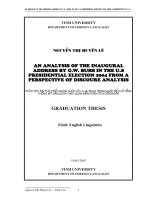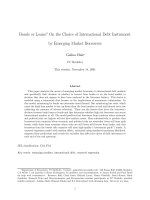Handbook of international banking edited by andrew w MUllineux and victor
Bạn đang xem bản rút gọn của tài liệu. Xem và tải ngay bản đầy đủ của tài liệu tại đây (3.07 MB, 827 trang )
Handbook of International Banking
To Judith and Jullie
Handbook of
International Banking
Edited by
Andrew W. Mullineux
Professor of Global Finance, University of Birmingham, UK
and
Victor Murinde
Professor of Finance, University of Birmingham, UK
Edward Elgar
Cheltenham, UK • Northampton, MA, USA
© Andrew W. Mullineux and Victor Murinde 2003
All rights reserved. No part of this publication may be reproduced, stored in
a retrieval system or transmitted in any form or by any means, electronic,
mechanical or photocopying, recording, or otherwise without the prior
permission of the publisher.
Published by
Edward Elgar Publishing Limited
Glensanda House
Montpellier Parade
Cheltenham
Glos GL50 1UA
UK
Edward Elgar Publishing, Inc.
136 West Street
Suite 202
Northampton
Massachusetts 01060
USA
A catalogue record for this book
is available from the British Library
Library of Congress Cataloguing in Publication Data
Handbook of International Banking / edited by Andrew W. Mullineux and
Victor Murinde.
p. cm.
Includes index.
1. Banks and banking, International—Handbooks, manuals, etc.
2. International finance—Handbooks, manuals, etc. I. Title: International
banking. II. Mullineux, A.W. III. Murinde, Victor.
HG3881 .H2665
332.1Ј5—dc21
2003
2002032048
ISBN 1 84064 093 6
Printed and bound in Great Britain by MPG Books Ltd, Bodmin, Cornwall
Contents
List of figures
List of tables
List of exhibits
List of contributors
Preface
PART I
ix
xi
xiii
xv
xxix
THE GLOBALIZATION OF BANKING
1
Globalization and convergence of banking systems
Andrew W. Mullineux and Victor Murinde
2
Multinational banking: historical, empirical and case
perspectives
Elisa A. Curry, Justin G. Fung and Ian R. Harper
27
Asset-backed securitization, collateralized loan obligations
and credit derivatives
Warrick Ward and Simon Wolfe
60
3
PART II
3
BANKING STRUCTURES AND FUNCTIONS
4
The new world of euro banking
Jean Dermine
105
5
Competitive banking in the EU and Euroland
Edward P.M. Gardener, Philip Molyneux and
Jonathan Williams
130
6
How to tie your hands: a currency board versus an
independent central bank
Jakob de Haan and Helge Berger
156
7
Free banking
Kevin Dowd
173
8
Islamic banking
Humayon A. Dar and John R. Presley
191
v
vi
Contents
9
Universal banking and shareholder value: a contradiction?
Ingo Walter
207
10
Foreign exchange trading activities of international banks
Jürgen Eichberger and Joachim Keller
237
11
The settlement and financing of international trade
Ayse G. Eren
259
12
Costs and efficiency in banking: a survey of the evidence from
the US, the UK and Japan
Leigh Drake
283
PART III
BANKING RISKS, CRISES AND REGULATION
13
Country risk: existing models and new horizons
Sarkis Joseph Khoury and Chunsheng Zhou
327
14
The causes of bank failures
Shelagh Heffernan
366
15
International banking crises
Alistair Milne and Geoffrey E. Wood
403
16
Some lessons for bank regulation from recent financial crises
David T. Llewellyn
428
17
Reforming the traditional structure of a central bank to cope
with the Asian financial crisis: lessons from the Bank of
Thailand
Andrew W. Mullineux, Victor Murinde and Adisorn
Pinijkulviwat
486
18
Capital flight: the key issues
Niels Hermes, Robert Lensink and Victor Murinde
516
19
International banks and the washing of dirty money: the
economics of money laundering
Kent Matthews
546
20
The regulation of international banking: structural issues
Richard Dale and Simon Wolfe
572
21
US banking regulation: practice and trends
Joseph J. Norton and Christopher D. Olive
612
22
Deposit insurance and international banking regulation
C. Charles Okeahalam
637
Contents
vii
PART IV THE EVOLVING INTERNATIONAL FINANCIAL
ARCHITECTURE
23
The institutional design of central banks
Falko Fecht and Gerhard Illing
671
24
The International Monetary Fund: past, present and future
Ian W. Marsh and Kate Phylaktis
699
25
Reforming the privatized international monetary and
financial architecture
Jane D’Arista
721
Globalization, the WTO and GATS: implications for the
banking sector in developing countries
Victor Murinde and Cillian Ryan
751
26
Index
765
Figures
2.1
3.1
3.2
3.3
3.4
8.1
8.2
10.1
10.2
10.3
10.4
12.1
12.2
16.1
16.2
19.1
19.2
19.3
19.4
19.5
19.6
19.7
19.8
19.9
20A.1
20A.2
20A.3
20A.4a
20A.4b
20A.4c
20A.5
US banking and representative operations of international
banks, December 1996
The asset-backed securitization process
Constituents of collateralized debt obligations
Potential CLO market development
Sample of a typical CLO structure
The bank’s profits and composition of investments
Organizational structure of a typical Islamic bank
Pole chart
Moving average
Head-and-shoulders pattern
Foreign exchange market
Farrell efficiency
Scale and technical efficiency
Real estate and stock prices in selected Asian countries
Financial sector lending: growth and leverage, 1990–96
Number of IBCs by jurisdiction
Loan-back scheme
Taxonomy of money laundering
Return–safety–confidentiality trade-off
Loan and deposit markets: partial equilibrium
Loan and deposit markets: effects of an increase in degree
of confidentiality
Effect of increase in money laundering on loans and
deposits
Effect of increase in money laundering on external sector
Effect of an increase in money laundering
UK regulatory structure
Australian regulatory structure
Japanese new financial regulatory structure
US regulatory structure
US depository regulatory structure
US Glass–Steagall reform: Financial Services
Modernization Act 1999
New Zealand regulatory structure
ix
41
63
65
69
70
197
200
242
243
244
253
290
291
435
441
550
552
552
554
559
560
562
563
564
598
600
602
604
606
608
610
x
Figures
23.1
23.2
23.3
23.4
23.5
23.6
23.7
25A.1
25A.2
25A.3
25A.4a
25A.4b
A control problem of the central bank: finding a welfaremaximizing monetary policy
The time-inconsistency problem
Asymmetric information and inflation expectations
Optimal monetary policy
The effect of a conservative central banker
Central bank independence and average macroeconomic
performance, 1961–1990
The Walsh contract between the government and the
central bank
Clearing function
Exchange rate adjustment
Adjustment in reserve holdings
International open market operations (expansionary)
International open market operations (contractionary)
674
676
681
684
688
690
693
745
746
747
748
749
Tables
3.1
3.2
3.3
European MBS/ABS issuance by asset type, 1997 and 1998
Some of the major CLOs issued, as at January 1998
Example of CLOs in facilitating a higher RAROC on
investment-grade assets
3.4
Comparison of spreads in different types of securitized
funding
3.5
Breakdown of the SBC Glacier CLO floating rate assetbacked securities
3.6
Summary of BIS proposed risk weightings
4.1
Currency and home-country relationship in the choice of
the bond bookrunner, 1996
4.2
Top underwriters of US debt and equity, January to July
1999
4.3a Mutual funds managers in France, December 1996
4.3b UK league of segregated pension fund managers, 1998
4.4
Interest margins of commercial banks
4.5
Domestic bank mergers in Europe
4.6
International bank mergers in Europe
4.7
Bank rankings
4.8
Market concentration
5.1
Number of banks: banking system, 1984–1997
5.2
Number of branches, 1984–1997
5.3
Concentration in European banking, 1997
5.4
Net interest margins, 1984–1997
5.5
Non-interest income/gross income, 1984–1997
5.6
Cost–income ratios, 1984–1997
5.7
Return on equity, 1984–1997
5.8
Extent to which strategy has been revised in response to the
SMP for broad product areas
5.9
Nature of strategic responses to the SMP for broad product
areas
6.1
Currency boards: an overview
6.2
Macroeconomic performance under alternative exchange
rate regimes
10.1
Foreign exchange market turnover
xi
62
68
75
76
84
96
109
110
111
111
116
118
119
123
124
131
132
133
134
135
136
136
142
143
158
161
238
xii
Tables
10.2 Foreign exchange dealers in the United States
14.1 Definitions of explanatory variables tested
14.2 Panel logit model accepted as superior to its multinomial
logit counterpart
14.3 Results of multinomial logit regressions using PROFIT1
14A.1 Banks included in the International Pool
15.1 ‘Commercial crises’, eighteenth and nineteenth centuries
15.2 National banking era panics
15.3 Recent banking problems in major economies
16.1 Stock market prices index
16.2 Stock market prices index (property sector)
16.3 Private capital flows to Asian countries
16.4 Bank lending to private sector (% growth)
16.5 Bank lending to private sector (% of GDP)
16.6 Banking system exposure to property
17.1 Bills, loans and overdrafts of commercial banks, classified
by sector
17.2 Net private financial flows into Thailand
17.3 Movements in interest rates and exchange rates during the
reform period
17.4 Credit granted by BIBFs
18.1 Overview of empirical studies on the determinants of
capital flight
18.2 Capital flight and policy uncertainty
18.3 Stability test results
20.1 Targets of regulation
20.2 Recent European cross-functional mergers, 1998–1999
20.3 Recent US cross-functional mergers, 1997–1998
20.4 Traditional-style regulatory framework
20.5 Structure of financial regulatory agencies
22A.1 Design features of explicit deposit insurance systems, 1995
25.1 Assets of institutional investors
25.2 Capital flows to developing countries
25.3 Debt and the crisis countries
25.4 Highly indebted poor countries: a profile
238
390
391
393
401
409
410
412
436
436
437
439
440
440
488
491
494
500
529
537
538
578
579
580
585
590
666
723
725
732
733
Exhibits
9.1
9.2
9.3
9.4
9.5
9.6
9.7
9.8
9.9
13.1
13.2
13.3
13.4
13.5
13.6
13.7
13.8
13.9
13.10
Universal bank organization structures
Book, market and potential equity values in universal banks
Estimated major bank IT spending levels
Economies of scale and scope in financial services firms –
the evidence
Market-to-book equity value, UK
Price-to-book ratios of US money-centre and major
regional banks
Universal banking conflict matrix
Alternative bank–industry linkages
Comparative return analysis: Chase Manhattan Bank,
1991–1995
Bank sector performance relative to the S&P 500, the Dow,
and the NASDAQ
Frequently used variables in qualitative and quantitative
models
International transfer risk: examination objectives
Country risk
Country risk analysis: country risk tree
Sovereign ceilings for foreign-currency ratings
Ranking of countries according to level of economic
security in 1995
Statistical release: country exposure lending survey
Summary of proposed country risk model
The extension of the probit model of country risk
xiii
209
211
214
215
219
220
222
226
230
332
337
341
343
345
346
347
349
361
362
Contributors
Helge Berger is currently at the International Monetary Fund. At the time
of writing he was Research Director, CESifo (Center for Economic Studies
and Ifo Institute for Economic Research, Munich, Germany) and Senior
Lecturer at the University of Munich (LMU). Berger received his Masters
degree and his PhD in economics from the University of Munich. He has
been at Princeton University’s Woodrow Wilson School as the John Foster
Dulles Visiting Lecturer. He has written a number of papers on German
monetary policy. He has also worked in several other fields, including
German and European monetary policy, central bank independence, regulation and exchange rate systems.
Elisa A. Curry was employed as a research assistant at the Melbourne
Business School for four years from 1997 to 2001 conducting research into
the Australian financial services industry. Her research on financial convergence in the Australian financial services sector (conducted jointly with
Professor Ian Harper) was published in the North American Actuarial
Journal in 2000. Her research into the economic costs of retail payment
instruments in Australia was cited in the 1997 Australian Financial System
(Wallis) Inquiry. She is currently employed as an investigative officer at the
Australian Securities and Investments Commission.
Jane D’Arista is Director of Programs at the Financial Markets Center in
Philomont, VA. Previously she taught on the graduate programme
in International Banking Law at Boston University School of Law
and served as Chief Financial Economist for the Subcommittee on Telecommunications and Finance of the House Energy and Commerce
Committee. Before that, she served for five years as an international analyst
at the Congressional Budget Office and for 12 years as a staff member of
the House Banking Committee. Her publications include The Evolution of
U.S. Finance, a two-volume set published by M.E. Sharpe in 1994.
Richard Dale is Professor of International Banking at the University of
Southampton, UK, Visiting Professor at the University of Reading and
Visiting Professorial Fellow at Queen Mary and Westfield College,
University of London. He has written extensively on the subject of
xv
xvi
Contributors
financial regulation and is a member of the European Shadow Financial
Regulatory Committee.
Humayon A. Dar is a lecturer in economics at Loughborough University,
UK. His interest in Islamic banking stems from his studies at the
International Islamic University, Islamabad. Dr Dar further studied
Islamic finance at the University of Cambridge and received his PhD in
1996. Since then he has published many papers on Islamic economics,
banking and finance and has advised government and non-government
organizations. As a specialist in Islamic economics and finance, he has been
involved in organizing seminars and conferences in this field. He is
presently a joint director of the MSc programme in Islamic Economics,
Banking and Finance at Loughborough University. In addition, he is interested in microcredit financing, factors affecting foreign direct investment in
developing countries, and institutional changes in agrarian societies. He is
a member of a number of professional organizations, has served as referee
for journals on Islamic economics and finance, and is a member of the
Advisory Board for the International Journal of Islamic Financial Services.
Jakob de Haan is Professor of Political Economy, University of Groningen,
The Netherlands. He is also Scientific Director of SOM (Systems,
Organization and Management, the research school of the faculties of
Management and Organization, Economics, and Spatial Sciences of the
University of Groningen). He graduated from the University of
Groningen, where he gained his PhD. He has published extensively on
issues such as public debt, monetary policy, central bank independence,
political and economic freedom and European integration. His most recent
book is European Monetary and Fiscal Policy (jointly written with Sylvester
Eijffinger) (Oxford University Press, 2000). He is also on the editorial
boards of Public Choice and the European Journal of Political Economy.
Jean Dermine holds a Docteur ès Sciences Economiques from the Catholic
University of Louvain and Master of Business Administration from
Cornell University, and is Professor of Banking and Finance and Director
of the Centre for International Financial Services at INSEAD (the
European Institute for Business Administration). Author of numerous articles on asset-liability management, European financial markets and the
theory of banking, Jean Dermine has published four books and has had
various research papers published in the Journal of Financial Intermediation, the Journal of Money, Credit, and Banking, and the Journal of
Banking and Finance, as well as in other academic and professional journals. Laureate of the 1997 European Investment Bank (EIB) Prize for his
Contributors
xvii
essay ‘Eurobanking, a New World’, he is co-author of ALCO Challenge, a
computer-based training simulation used in Europe, the Americas and
Asia. Jean Dermine has been Visiting Professor at the Wharton School of
the University of Pennsylvania, at the universities of Louvain and
Lausanne, a Salomon Center Visiting Fellow at New York University, and
a Danielsson Foundation Guest Professor of Bank Management at the
Göteborg and Stockholm Schools of Economics.
Kevin Dowd is Professor of Financial Risk Management at Nottingham
University Business School, UK. He previously worked for the Ontario
Economic Council, the University of Sheffield, and Sheffield Hallam
University. His main research interests are in the areas of financial and
monetary economics and, in particular, free banking and financial risk
management. His most recent book was Money and the Market: Essays in
Free Banking (Routledge, 2000).
Leigh Drake is Professor of Monetary Economics in the Economics
Department at Loughborough University, UK and is Deputy Director of
the Loughborough University Banking Centre. He is the author of The
Building Society Industry in Transition (Macmillan, 1989) and has published widely in the areas of money and banking in journals such as: the
Economic Journal; Review of Economics and Statistics; the Journal of
Money, Credit and Banking; Oxford Economic Papers; Financial Stability
Review; Manchester School; and Applied Financial Economics. His main
research interests in the field of banking include: costs and efficiency in
banking; delivery channels and the pricing of bank services. He has acted
as a consultant to a number of leading banks and building societies.
Jürgen Eichberger is Professor of Economics at the University of
Heidelberg in Germany. He obtained his degrees (Diplom-Volkswirt, Dr.
rer. pol.) from the University of Mannheim in Germany. For more than ten
years, he taught at the University of Western Ontario in Canada, the
Australian National University in Canberra and the University of
Melbourne in Australia. In 1995, he returned to Germany and took up a
chair at the University of Saarland. His research interests are focused on
decision making under uncertainty, game theory and financial economics.
His papers have appeared in major economic journals, and he has published several books.
Ayse G. Eren graduated in economics and management from Cardiff
Business School, University of Wales, Cardiff in 1991. She went on to
receive her MSc in international economics, banking and finance from the
xviii
Contributors
same university in 1993. She then joined the National Westminster Bank
where she worked as a specialist in international trade finance until the end
of 1999. Currently, she works as a Senior Relationship Manager at the
Development Bank of Singapore, in London, with portfolio responsibility
for a range of large corporate clients trading internationally. Since her
graduate days, she has continued to contribute to the economics and
finance literature.
Falko Fecht obtained a Masters degree in economics from the University of
Frankfurt, Germany, in 1997, and thereafter worked in the Economics
Department of the BHF-Bank. In 1998, he took up a position as Research
Assistant at the Economics and Business Administration Faculty of his
Alma Mater. Since October 2000, he has been working with the Economics
Department at the Deutsche Bundesbank, in Frankfurt am Main, Germany.
Justin G. Fung is an Associate in the Melbourne office of The Boston
Consulting Group. He specializes in corporate strategy, financial services
and telecommunications. He has published peer-reviewed papers on a
variety of subjects, including hospital network costs, patents and competition law and Chinese constitutional law. Prior to joining The Boston
Consulting Group, he was a Research Fellow with the Department of
Economics at the University of Melbourne and a Senior Research Assistant
in the Centre of International Finance at the Melbourne Business School.
Edward P.M. Gardener is Director of the School for Business and Regional
Development (SBARD) at the University of Wales, Bangor. Professor
Gardener has published over 200 articles and papers on banking topics. His
most recent books (co-authored) include Investment Banking: Theory and
Practice (Euromoney, 1996), Efficiency in Banking (John Wiley, 1996),
European Savings Banks – Coming of Age? (Lafferty Publications, 1999),
Strategic Challenges in European Banking (Macmillan, 2000) and Bank
Strategies and Challenges in the New Europe (Palgrave, 2001). During
1995/96 he co-directed (with economists from Cambridge University) a
major EC DG XV project (published by Kogan Page, 1997) on the impact
of the European Single Market on the EU credit institutions and banking.
Since then he has conducted project research for the World Bank and codirected (with Cambridge economists) a major banking project input to the
HM Treasury Cruickshank Review of Banking Services in the UK.
Ian R. Harper is Professorial Fellow in the Melbourne Business School
at the University of Melbourne, Australia. From 1993 to 1997, he held
the Ian Potter Chair of International Finance in the School. His research
Contributors
xix
interest lies in the field of financial intermediation. His publications
include policy-orientated papers on a variety of subjects, including the
effects of financial deregulation, the economics of saving, bank supervision, mergers in the financial sector and the role of superannuation. He
is co-author with Jürgen Eichberger of a graduate text on financial economics published by Oxford University Press. Prior to joining
Melbourne Business School, he was Professor of Monetary and
Financial Economics at the University of Melbourne. He has also held
positions at the Australian National University in Canberra, Princeton
University in the United States and the Reserve Bank of Australia in
Sydney.
Shelagh Heffernan, BA (Toronto), MPhil (Oxon), DPhil (Oxon) is
Professor of Banking and Finance at Cass Business School, City
University, London. She was a Commonwealth Scholar at Oxford and has
been a visiting professor at several Canadian universities. Grants for
research in banking include Leverhulme and HM Treasury. Books include
Sovereign Risk Analysis (Unwin Hyman, 1986), Modern International
Economics (co-authored with Peter Sinclair) (Blackwell, 1990), and
Modern Banking in Theory and Practice (Wiley, 1996); the last book is also
published in Chinese, and a new edition is forthcoming. Her research interests include competition in the financial sector, the causes of bank failure,
financial regulation, e-cash and the performance of mutual funds. She has
published widely in journals, including the Journal of Banking and Finance,
Economica, the Journal of Money, Credit, and Banking and the Journal of
Financial Services Research, with a number of entries in the International
Encyclopedia of Business & Management.
Niels Hermes is Associate Professor at the Department of Management
and Organization of the University of Groningen, The Netherlands. His
fields of specialization include development economics, international
finance and monetary economics. He has published on issues such as
finance and development, investment and finance, capital flight, and
exchange rate systems in the Journal of International Money and Finance,
the Journal of Banking and Finance, and the Journal of Development
Studies, among others. He has also co-edited two books.
Gerhard Illing is Professor of Macroeconomics in the Department of
Economics at the University of Munich. He obtained an MPhil from the
University of Cambridge (DAAD scholarship) in 1981, followed by a PhD
(Dr. rer. pol.) from the Economics Faculty of the University of Munich, in
1984, after completing a thesis on ‘Money and asymmetric information’.
xx
Contributors
During 1987–92, he was an Assistant Professor at the Economics Faculty
of the University of Munich, during which time he completed his
Habilitation (1992: Heisenberg Scholarship). He was also Professor of
Economics at the University of Bamberg in 1993–95 and Professor in
Economic Theory at the Goethe University Frankfurt in 1995–2001, before
taking up his current position. He has held visiting professorships at the
University of Western Ontario (1986/87; 1998); the University of
Pittsburgh Center for Economic Research and Graduate Education
(CERGE) in Prague (1992); the University of Freiberg (1991/92); and the
Fern Universität Hagen (1994/95). He has published widely in many
leading journals, in the area of applications of game theory to monetary
theory and policy.
Joachim Keller is an economist at the research centre of the Deutsche
Bundesbank, where he works on the development of new financial indicators. Prior to joining the Bundesbank he was a student of economics at the
University of Pisa, Italy and at the University of Saarland, Germany,
where he graduated as an economist in 1995 and where he is completing his
thesis ‘The effect of new information on the exchange rate’ under the supervision of Professor Richter. His research interests lie in the field of monetary and international economics as well as banking and finance.
Sarkis Joseph Khoury is Professor of Finance and International Finance
and Executive Director of the Foundation for Research in International
Banking and Finance at the University of California-Riverside. He is also
editor, associate editor and reviewer for many academic journals. He is also
a member of the Board of Directors of the Philadelphia Board of Trade.
Dr Khoury has authored or edited 22 books and monographs dealing with
international banking, international finance, mergers and acquisitions, the
stock markets and other investment vehicles. His numerous articles have
appeared in some of the leading journals in their field. He has lectured all
over the world on a wide range of financial issues, and has served as a
consultant to corporations, individuals and academic institutions. Dr
Khoury gained his PhD from the Wharton School of the University of
Pennsylvania.
Robert Lensink is Professor of Finance at the Faculty of Economics,
University of Groningen, The Netherlands. He is also an External Fellow
of the Centre for Research in International Trade and Development
(CREDIT) at the University of Nottingham, UK. His main fields of interest are finance and development, and firm-level investment. He has published widely on these issues, both in international journals and in books.
Contributors
xxi
His most recent book, co-authored with Hong Bo and Elmer Sterken, is
Investment, Capital Market Imperfections and Uncertainty: Theory and
Empirical Results (Edward Elgar, 2001).
David T. Llewellyn is Professor of Money and Banking at Loughborough
University, UK, and Chairman of the Loughborough University Banking
Centre. He has formerly held positions at Unilever (Rotterdam), HM
Treasury (London), the University of Nottingham, and the International
Monetary Fund (Washington). He has been a Public Interest Director of
the Personal Investment Authority (London) and has served as a consultant to banks and regulatory agencies in several countries. His main
research interests are in the analysis of financial systems, the theory and
practice of bank behaviour, the causes of banking crises and the theory and
practice of financial regulation. Recent books include: The New Economics
of Banking (SUERF, 1999) and Financial Regulation: Why, How and Where
Now? (with Charles Goodhart) (Routledge, 1998). The chapter in this book
is based on a project undertaken for De Nederlandsche Bank on the regulatory implications of banking crises. In 2000, he was elected President of
the Société Universitaire Européenne de Recherches Financières
(SUERF).
Ian W. Marsh holds degrees from Sheffield, London (Birkbeck) and
Strathclyde Universities. He is a senior lecturer in finance at Cass Business
School and a research affiliate at the Centre for Economic Policy Research.
He previously taught at Strathclyde University and has held visiting positions at the universities of Malta, Bolzano and Palermo. He has recent publications in the Journal of Monetary Economics, the Review of Economics
and Statistics and the Journal of International Money and Finance, and is
co-author of Exchange Rate Modelling (Kluwer, 1999).
Kent Matthews is the Sir Julian Hodge Professor of Banking and Finance,
Cardiff University, UK. He took degrees at the London School of
Economics, Birkbeck College, and the University of Liverpool. He has held
research and academic appointments at the London School of Economics,
the National Institute of Economic & Social Research, the University of
Liverpool, the University of Leuven (Belgium), the University of Clemson
(USA), the University of Western Ontario (Canada), Liverpool Business
School and Humbolt University (Berlin). He has held professional
appointments at the Bank of England and Lombard Street Research Ltd.
He was the principal forecaster for the Liverpool Macroeconomic Research
Group between 1980 and 1989. His research interests cover credit market
deregulation, macroeconomic forecasting and aspects of tax evasion and
xxii
Contributors
the black economy. He is the author and co-author of eight books, over 40
articles in scholarly journals and edited works, and over 30 articles in professional and popular journals.
Alistair Milne is senior lecturer in banking and finance at Cass Business
School in London. Previously he has been an economic adviser to the
Financial Intermediaries Division of the Bank of England, lecturer in economics at the University of Surrey, a research fellow at the London
Business School, and has worked for HM Treasury and the Government of
Malawi. He holds a PhD from the London School of Ecnomics, for an
econometric thesis on the determinants of inventory investment, and has
published papers on a range of academic and policy topics. He is course
director of the School’s MSc in banking and international finance and is
conducting research on: banking competition, especially in the area of
securities processing and payment systems; bank capital management and
bank regulation; and the impact of capital market frictions on firm and
household behaviour and the business cycle.
Philip Molyneux is currently Professor in Banking and Finance and
Director of the Institute of European Finance at the University of Wales,
Bangor. He also holds the Special Chair of Financial Services and
Financial Conglomerates at Erasmus University, Rotterdam, The
Netherlands. His main area of research is on the structure and efficiency of
banking markets and he has published widely in this area, including recent
publications in: the Journal of Banking and Finance, the Journal of Money,
Credit, and Banking, Economica, Economics Letters, the Journal of PostKeynesian Economics and Applied Economics. He has authored, coauthored and edited a variety of books, including Efficiency in European
Banking (John Wiley, 1996), Private Banking (Euromoney, 1996),
Investment Banking in Europe (Euromoney, 1996), German Banking
(Financial Times, 1996), Bancassurance (Macmillan, 1998), Financial
Innovation (John Wiley, 1999), European Savings Banks – Coming of Age?
(Lafferty, 1999) and the latest, European Banking: Efficiency, Technology
and Growth (John Wiley, 2001).
Andrew W. Mullineux is Professor of Global Finance and Director of the
Global Finance (Research) Group and the MBA (International Banking
and Finance) Programme in the Birmingham Business School at the
University of Birmingham, UK. He graduated in 1973 with a first class
degree in economics and was awarded a Masters in econometrics and mathematical economics by the London School of Economics and Political
Science in 1976. He completed his PhD on business cycles in January 1983.
Contributors
xxiii
After working for five years as a Lecturer in Economics in the Business
Studies Department at Liverpool Polytechnic (now John Moores
University) he moved to a research post in the Department of Economics
at the University of Birmingham, where he was subsequently employed
(apart from spending the 1988/89 academic year at the Cardiff Business
School) as Lecturer, Senior Lecturer and Professor of Money and Banking.
On 1 May 2001, he moved to the Birmingham Business School to take up
his current position. Mullineux has published numerous books and articles
in refereed academic and professional journals. He is currently Recorder of
Section F (Economics) of the British Association for the Advancement
of Science and Managing Editor of the 23rd (October 2001, Brussels)
Société Universitaire Européenne de Recherches Financières (SUERF)
Colloquium proceedings.
Victor Murinde is Professor of Finance as well as Director of the Corporate
Finance Research Group at the University of Birmingham, UK, and
Hallsworth Senior Research Fellow at the Institute of Development Policy
and Management, University of Manchester. He completed his PhD in
Economics at Cardiff Business School, University of Wales, Cardiff, in
1990. Thereafter he held positions as Lecturer in Banking at Cardiff
Business School, Senior Lecturer in Finance and later Reader in
Development Finance at the University of Birmingham. He has also
worked as a consultant to the World Bank, the United Nations and
UNCTAD (United Nations Conference on Trade and Development) as
well as to a number of banks, private companies and governments in developing and transition economies. Professor Murinde has published over 40
articles in many journals, including the Journal of Banking and Finance,
Journal of International Money and Finance, Review of International
Economics, Emerging Markets Review, Manchester School, Journal of
Policy Modelling, World Development, Economic Notes, Applied Economics
and Applied Financial Economics. His research interests cover corporate
finance issues in emerging financial markets, development and international banking, and flow of funds approach to macroeconomic policy modelling.
Joseph J. Norton is the James L. Walsh Distinguished Faculty Fellow in
Financial Institutions Law and Professor of Law, Southern Methodist
University School of Law, Dallas and (dual appointment) Sir John
Lubbock Professor of Banking Law at the Centre for Commercial Law
Studies, University of London. He currently holds professional positions
in banking/financial law in London, the USA and Hong Kong. He is considered one of the leading law experts in international banking and
xxiv
Contributors
financial law and in finance sector law reform matters. He has published
over 35 books and over 120 articles on related subjects, and has lectured on
banking and fiance law worldwide. He has practical experience with international and domestic (US) banking and capital markets transactions,
international financial regulatory matters, bank corporate and asset
restructuring and asset securitization. He is a Senior Research Fellow at the
Institute of European Finance (UK). Professor Norton is the Executive
Director of the London Institute of International Banking, Finance and
Development Law, of the London Forum for International Economic Law
and Development and of the Centre for Financial Studies and the Rule of
Law (BIICL-London). He currently is actively engaged in emerging
financial sector reform consultancies in Africa, South America, Central
and Eastern Europe, and East Asia.
C. Charles Okeahalam obtained a PhD in economics from the University
of London in 1991. Since 1999 he has been a professor at the University of
the Witwatersrand, South Africa, where he has held the Donald Gordon
Chair in Banking and Finance in the Graduate School of Business
Administration (1999–2000) and since 2000, the Liberty Life Chair in
Finance and Investment in the Department of Business Economics. He has
worked as an investment analyst and served as an adviser to a number of
central and commercial banks. During 1999–2000 he led the design, development and implementation process for the establishment of the South
Africa Deposit Insurance System.
Christopher D. Olive gained a degree in business administration (finance)
from the University of Miami, Florida, a J.D. from the Southern Methodist
University School of Law and an LL.M. (banking and finance law) from
the University of London. He is an Associate, Lending/Structured Finance
Group, Jones, Day, Reavis and Pogue, Dallas, Texas; Adjunct Lecturer in
Law, Southern Methodist University School of Law; and Fellow,
International Banking and Finance Law Unit, Queen Mary and Westfield
College, University of London. Christopher Olive’s experience includes
lending and structured finance and transactions and financial products,
including syndicated loan transactions, project, acquisition, aircraft,
venture capital and real estate finance and debt securities transactions, synthetic leasing and securitization transactions, structured derivatives transactions, bankruptcy finance and restructuring transactions, and banking
and securities regulatory matters.
Kate Phylaktis is Head of the Department of Banking and Finance,
Professor of International Finance and Director of the Emerging Markets









